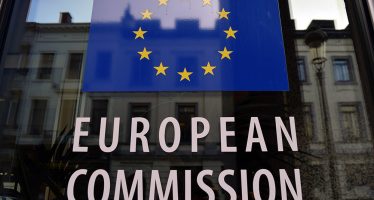Caught in a Bind: Tax Avoiders Excluded from Corona Relief Funds

Sultan Ahmed bin Sulayem, chairman and CEO of DP World. Pawan Singh / The National
Consider a company that has furloughed a quarter of its workforce, and now intends to fire these 1,100 workers, all the while screaming for the UK government to throw it a £150 million lifeline yet unwilling to scrap a £267 million payout to its owners, a wealthy foreign state that acquired the business last year for £322 million. The company’s boss is now unhappy, unimpressed, and dissatisfied because he has not yet received the funds requested.
However, what surprises perhaps most is the UK government actually considering the request for support filed by P&O Ferries, a company 80 percent owned by Dubai Ports Worlds. Not one to curry favours or mince words, DP World Chief Executive Sultan Ahmed bin Sulayem called the UK’s response to the corona outbreak ‘slow’ and said his shipping company will founder unless it manages to secure £257 million in financial support. He also emphasised the strategic importance of the shipping line and noted that P&O Ferries carries about 15% of all goods entering the UK.
As untold billions in state aid are being disbursed to keep businesses afloat and the economy from imploding, some companies have not yet received the memo: the funds are meant to support workers for the duration of the pandemic and ensure they have a job to return to once the virus has been contained and the lockdown eased. Using state funds to help finance dividend payouts or write fat bonus cheques is simply not allowed, apart from being morally questionable given the present circumstance.
Due to the vast volumes of cash involved, and the need to cut short lengthy due diligence processes normally attached to funding from official sources, it is inevitable that some of the money ends up in the wrong pockets. Like Virgin Atlantic before it, P&O Ferries seems to consider state support a right rather than a privilege.
Admittedly and commendably, the new owners of the shipping line linking UK ports to gateways on the continent have not bought into the elaborate tax avoidance schemes deployed by the P&O Ferries former parent company which was caught out by HM Treasury in 2013 for using ‘tricks’ to obtain £14 million in tax relief. However, the company now sorely and urgently needs to polish its tarnished public image. Sultan Suleyman’s flat refusal to call off the dividend payout caused an unhelpful uproar that may yet convince the government to place P&O Ferries in the same category of demerit as Sir Richard Branson’s Virgin Atlantic.
That airline, owned by the flamboyant billionaire, sought to obtain up to £500 million in financial support. However, the request was denied owing to Mr Branson’s status as a tax exile. Since taking up residence on a private Caribbean island in 2006, the businessman – said to be worth at least £4.5 billion – has paid no personal income tax in the UK. He has now pledged to mortgage his island and sell part of his holdings in Virgin Galactic, the fledging space travel company, to keep the airline aloft.
Mr Branson has also announced 3,000 layoffs and wants to bring in private equity to salvage what is left of his company. To trim the fleet for the sober post-corona era ahead, Virgin Atlantic disposed of its four ageing Airbus A340 aeroplanes, retiring two and selling the other two in a fire sale to the Malta-based charter airline Maleth Aero. The company also retired its last seven Boeing 747-400’s and four Airbus A330’s.
Even so, Virgin Atlantic CEO Shai Weiss keeps talking almost incessantly about a future public-private partnership, indicating that the UK taxpayer is not yet off the hook. Also, rallying private equity to save an airline that was already reporting steep losses before the pandemic may not have met with quite the enthusiasm anticipated.
In the UK and elsewhere, the corona pandemic has caused a shakeout, perhaps long-overdue, of companies that play by the rules and those that dodge the rules but now need help. Businesses that have depressed their earnings using a myriad of complex accounting tricks in order to minimise their tax exposure, now discover that the knife cuts both ways.
Earlier this week the governments of Denmark and Poland decided to no longer support companies that are registered in tax havens. Polish Prime Minister Mateusz Morawieski said that funds from the €22 billion business rescue package he recently unveiled will only be available to companies that pay domestic corporate taxes. “Tax havens are the bane of modern economies,” he added. The Polish prime minister also said that the money is meant to shield companies against foreign takeovers. Mr Morawieski had earlier expressed concern over the ‘encroachment’ of Chinese companies. The €22 billion now earmarked for businesses comes on top of last month’s €45 billion ‘anti-crisis shield’.
Though welcomed by most, the cash infusion is geared towards small- and medium-sized businesses, leaving large corporations to procure their own solutions. According to Grzegorz Baczewski of the Konfederacja Lewiatan employers’ association, this approach may result in big job losses. Large multinational companies employ an estimated three million people in Poland.
The €58 billion released by the Danish government for business support measures is also reserved for companies that are not domiciled in tax havens. However, it is not yet clear what constitutes a ‘tax haven’. Professor Duncan Wigan of the Copenhagen Business School points out that the European Union’s own blacklist does not include tax havens on the continent such as Ireland, The Netherlands, and Luxembourg: “If the restrictions are applied to larger Danish companies that maintain entities in one of those jurisdictions, it would bar the vast majority of them from receiving state support.”
Richard Murphy, a University of London professor in International Political Economy, agrees and says that recipients of state support must also commit to business models that promote environmental sustainability and strengthen corporate social responsibility: “Support cannot be unconditional. Society deserves a return on its invested capital and that includes an end to tax avoidance in addition to enhanced corporate transparency.”
The cruise line industry discovered early on in the pandemic that the usage of intricate tax avoidance stratagems comes with a price. In the US, large cruise operators were denied a slice of the $2 trillion initial support package approved by Congress. The Coronavirus Aid, Relief, and Economic Security (CARES) act specifically excludes companies not registered domestically.
With headquarters in Southampton and Miami, British-American Carnival Corporation’s US subsidiary is technically a Panamanian company and as such unable to apply for CARES credits and grants. Adding to the complication, Carnival’s British operation is registered in the UK and may thus apply for relief. The UK government has so far not excluded foreign-registered companies from receiving state-backed financial support although it is said to be looking into the matter as a result of the public outcry over the improbable plea from P&O Ferries.
Royal Caribbean International, the world’s largest cruise line by revenue and also headquartered in Miami, is incorporated in Liberia where the company pays next to nothing in taxes. With the notable exception of the Holland America Line, now part of Carnival, all major cruise companies operate their ships under exotic flags of convenience from countries both unable and unwilling to offer any help to the troubled industry. With no home port to turn to, more than fifty large cruise ships are currently riding at anchor close to the intersection of US and Bahamian territorial waters, waiting for either tourists to return or liquidators to move in.
You may have an interest in also reading…
Business in Times of Corona: Trillions mobilised to Prop Up Economies
There seems to be no upper limit to the volume of funds that governments can deploy to keep the fires
European Commission Warns Banks
There is money in the bank – and that is where it mostly stays. The credit facilities that are meant
Perfect Storm Brewing: The Winter of Our Discontent
Winter is coming. Instead of setting the stage for another spell-binding episode of an epic television drama, the ominous phrase


















































































